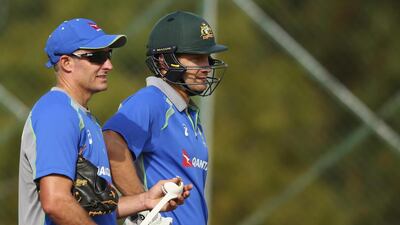It is not exactly that Australia have not taken cricket's shortest format seriously, but that, perhaps, they continue to invest greater seriousness in their planning of the other two longer formats.
They will deny it, of course, and with reason – the idea that Australia does not take a sport, any sport, seriously is preposterous, after all.
Actually, maybe it is not seriousness as much a case of simple competence and clarity, that maybe they do not really know what they are doing.
See also:
World Twenty20 by the numbers: Facts and figures that have shaped the tournament through the years
World T20: Pakistan cricket need more than Shahid Afridi – ‘this is not a one-man show’
The very idea is so disorientating – that Australia do not know what they are doing – that it is easy to confuse a lack of seriousness with a lack of clarity.
It is worth clarifying who we mean by “they” as well.
It is not the players.
Plenty of them know what they are doing in the format: David Warner, Glenn Maxwell, Aaron Finch, Shane Watson, James Faulkner are nearly half a team already of format stars.
No, the problem has usually been that those in charge of building a team, and thus, a vision.
Take, for example, Australia’s progress – or not – since the last World Twenty20, in which they fell at the first hurdle. Under George Bailey, they lost three of their four Super 10 games. All three were comprehensive.
For a start, since the end of that event, they have played only 11 T20Is (and just one in 2015).
Other than England and, strangely, West Indies, no side has played as few.
Granted their players get plenty of opportunity in some of the best Twenty20 leagues in the world, not least their own, the Big Bash League (BBL).
But there still seems no cohesiveness, no clear identity about the team on the international stage.
If you include Bailey, they have now had three captains in the format in less than two years. They have replaced Finch with Steve Smith just before a major event.
In all, since playing their first T20I in 2005, they have used nine captains: these are very un-Australian responses to a problem.
As revealingly, in the 11 games since the last event they have handed out a staggering 16 debuts.
In their first game after the 2014 event, they handed out four new caps. In the past four games before their opener against New Zealand on Friday, they have given eight debuts.
Very rarely have they played the same XI in successive matches.
This nail was hit precisely on the head by Watson recently, while, as it happens, he was standing in as captain.
“No doubt that’s the biggest challenge for the Australian Twenty20 team – and always has been, when I’ve been a part of it – is until the Twenty20 World Cup the priority for the best players playing all the time is not always there, because there’s so much cricket that is on.
“You’ve just got to manage your best players as well as you can, which always means there’s no continuity with Twenty20 teams up until a game or two before the Twenty20 World Cup.
“That’s happened in every Twenty20 World Cup I’ve been a part of, which does make it challenging, there’s no doubt.
“When you play in a BBL team or IPL team you just about know your best team.
“Everyone knows their specific roles, and are consistently doing them throughout a whole season.
“But when there’s only a few Twenty20s here and there, throughout a long summer, it provides a huge challenge to be able to get your best players playing in their best positions.”
On paper of course, they look like contenders. With that much IPL experience they have to.
But look deeper at the squad and the lopsided mix of the experienced with the very inexperienced.
Note that they might be short on quality spinning options, and they are not alone at this event in being so.
They are definitely going to miss Mitchell Starc.
And they remain susceptible on slow, gripping surfaces given to spin. They will come across a couple of those, too.
All together, it could be that come April 3 the World Twenty20 remains the one major trophy that continues to elude them.
Follow us on Twitter @NatSportUAE
Like us on Facebook at facebook.com/TheNationalSport

